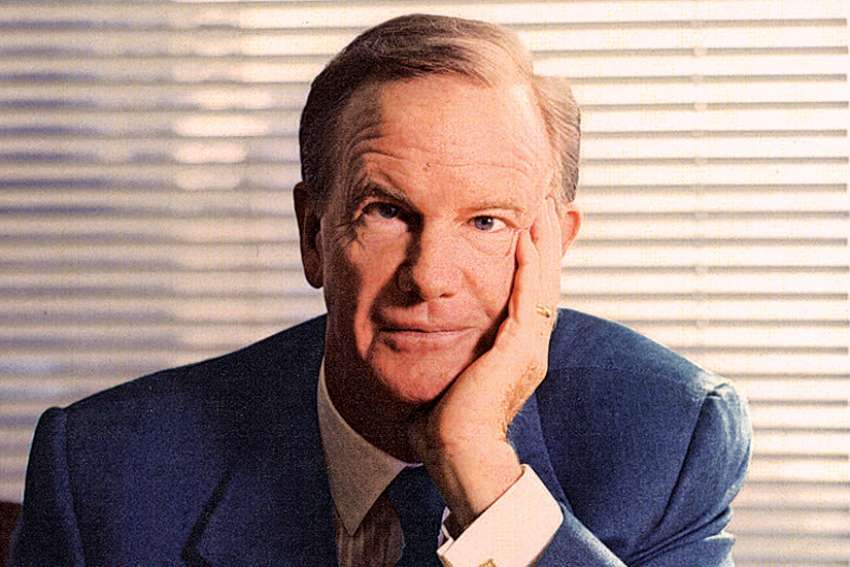So, I’ve been thinking of that great Canadian entrepreneur lately. Ted — he always insisted on being called by his first name — was a lot of things. But most of all, he was an optimist. Unquestionably, he was the most optimistic person I ever met. He was the embodiment of Winston Churchill’s line: “The pessimist sees difficulty in every opportunity. The optimist sees the opportunity in every difficulty.”
Indeed, Ted’s trademark saying was: “The best is yet to come.” He ended every speech with it and his quote can be seen painted on Rogers trucks.
Today, 60 years after Ted started his business journey with an $85,000 loan, Rogers Communications has annual revenues exceeding $15 billion and its market capitalization — what it’s worth — is more than $33 billion. Like the company or not, Rogers also provides 26,000 jobs to Canadians and their families.
When he was young — and at least into his 50s — Ted was a maverick, disliked by many in Toronto’s Establishment for shaking things up, taking on behemoths like Bell Canada and making bankers nervous with his supposed reckless spending.
He protested a lot. He protested when the government gave preferential treatment to Bell, when tight-fisted bankers were choking his ability to grow, when the regulator favoured staid Canadian broadcasters over innovation. But at heart, Ted was a builder who never lost his sense of optimism.
Today, it seems everyone is protesting something. It’s difficult to be optimistic when the news is filled with protests around the globe: from Spain, Hong Kong and France to Lebanon, Bolivia, Chile, Czechia and more.
It’s not that protestors don’t have legitimate beefs on critical issues like human rights and climate change.
It’s just that there’s a feeling out there — at least to this observer — that things in the world will get much worse before they get better. A friend joked the other day that he wanted to go for a driving tour in the United States to visit “future” Civil War sites. It was a funny line, but its implication left a sinking pit-in-the-stomach feeling.
It feels like there’s a growing blanket of anger out there and nihilists, anarchists and politicians feed on this righteous popular anger.
Perhaps the best example of this anger comes from the Mouvement des Gilets jaunes (yellow vests). It started in France more than a year ago as a populist, grassroots movement for economic justice. Now, who can say exactly what they’re protesting every week?
Things turned ugly in Paris recently once again when masked demonstrators attacked police and other emergency workers and tried to destroy a memorial honouring a French Second World War hero.
Wearing a Joker mask, a protestor standing in front of a street fire held a sign in English that read: “Everything must go.” Many around him can be seen whistling and cheering.
But what has been achieved and what does “Everything must go” really mean? The number of people who have lost an eye during protests in France in the last year now stands at 24. This, in addition to five lost hands, 315 head injuries (including fractured jaws and skulls) and two deaths, according to a fact-checked count for Médiapart.
Around the world, anti-Semitism is on the march with rising numbers of hate crimes, and Islamist extremists still kill. Then there’s the impeachment hearing in the U.S. Congress of a flawed human being and the protests for and against him.
Kids today use the word “sick” to mean really good. Will “the best is yet to come” soon flip “best” into meaning worst or baddest?
Judging by how we talk to each other on social media, that would not be beyond the realm. Just a few minutes browsing Facebook often astonishes at the amount of creativity and energy spent on insulting and demeaning people.
The recent federal election was the nastiest and, perhaps, most divisive ever. Will the next one be even more so?
Two weeks before his death, I told Ted Rogers that I would never meet anyone as optimistic as him. From his hospital bed in Toronto General, he remarked: “Don’t say that. That puts limits on you. Who’s to say you won’t meet someone more optimistic?”
Ever the optimist, he was.
Here in Canada, saying “the best is yet to come” still makes sense, especially compared to other places in the world, but further degradation of social intercourse opens a dangerous door.
Here’s an idea: Let’s start with political leaders in the next election rising to new heights, not sinking lower with ever-nastier, negative campaigning. There’s far less traffic congestion on the high road. Let’s demand our political leaders take us there.
(Brehl is a writer and author of many books.)


